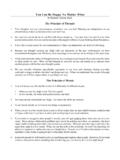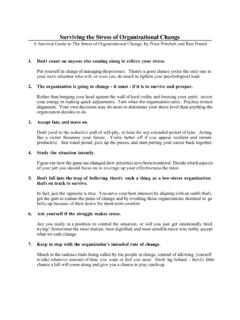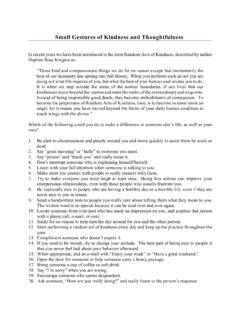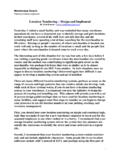Transcription of Recognizing Good Performance - Melba W. Benson, Ph.D ...
1 Recognizing good PerformanceDiscipline Without Punishmentby Dick GroteTo create a well-disciplined organization, the manager has two primary responsibilities:1. To recognize and reinforce good To confront and correct poor spent on Recognizing the good Performance generated daily by the great majority of organizationmembers will result in far less time spent on problem is a function of its consequences. The things that a person does and says are influenced toa great extent by what happens to that person as a virtually every organization the level of Performance provided by organization membersforms the familiar bell-shaped one end of the curve there will be a small number of people whose Performance is outstandingor At the other end will be another small number whose Performance is In the middle will be the great majority of individuals, some of whom will be performingbetter than others, all of whom will fall between the two extremes of distinguished managers allocate their time as follows:1.
2 The greatest amount of time is spent with poor The second group that commands the manager s attention is the exceptional The great majority of people somewhere in the middle are whose Performance is somewhere in the middle form the backbone of the we ignore them, we eliminate the incentive for them to overall Performance of any organization or subunit cannot be significantly influenced by actionof those at the high end or the low end of the Performance scale because the population in each istoo small to make a critical is with the solid, competent performer that the greatest opportunity for increasing overallorganizational Performance lies. If each individual in the huge population of middle-groundperformers increases his/her contribution by just 10%, the impact on the entire organization good Performance2 When is Recognition Appropriate?
3 Three situations where recognition of good Performance is appropriate:1. When an individual has done something above and beyond the call of duty. an employee has significantly improved Performance either after a coaching or disciplinarytransaction or by his/her own When an employee hasn t done anything particularly special or outstanding. The individualhas simply met all the organization s expectations over a long period of those in the third group are doing exactly what we expect, it is easy to overlook the need manager s challenge is to find examples of good Performance to Specific Behaviors to RecognizeIt is as important to be specific when Recognizing good Performance as it is when trying to bringabout a Performance correction.
4 If we cannot tell employees exactly what it is that causes us to feelgood about their Performance , the odds are slim that they will be able to continue that test for determining whether your description of an individual s Performance is specific is toconsider whether you can make a snapshot or movie or tape recording of it. If you can, it s you cannot, it isn :You can t take a snapshot of a good could make a tape recording of someone saying, Here, let me help you withthat. When managers narrow their description of an individual s Performance to actions and behaviorsthat are specific and precise, they often feel that the behavior they are describing seems somewhatsmall-even superior job Performance is not a matter of doing a few things heroically.
5 It is a matter of doinga great many small things a manager provides recognition for small stuff, the big deals will take care of good Performance is recognized and appreciated by the organization, the great majority ofemployees won t care how disciplinary cases are good Performance3 Guidelines for Effective Recognition1. Recognize good Performance Recognition is most influential when it rapidly follows the behavior being Recognition is most effective when it is directed to specific individuals rather than to teams orgroups of is most effective when it is tailored to the preferences of the individual. For example,some employees like to have their contributions made known to the group directly.
6 Othersprefer that their achievements be acknowledged Recognition needs to be proportionate to the Performance . The sincerity and good sense of amanager who praises a minor contribution lavishly is questioned by the recipient and by Don t wait until a person has performed perfectly to provide recognition. Acknowledge theminor achievements that produce the ultimate ToolsOur words are the most important tool we have to influence the Performance of others. Simplytelling someone that we have noticed and appreciate his/her good Performance in one area of his/her job increases the probability that the good Performance will tools for Recognizing Performance :1. Write a memo to the employee and put a copy in his/her personnel Write a quick thank you on a Post-It note and leave it on the employee s Write your boss a memo about what the employee is accomplishing and send a copy to Ask the employee s advice about a business-related matter, such as how to reduce waste,how to improve customer service, how to reorganize the work flow when someone is out.
7 Buy the employee a coke or a cup of Clip an article of interest from the newspaper and pass it along to the Assign the employee to work on a desirable the employee to a visitor and explain to the visitor how the employee s workcontributes to the success of the all of these, the most important are the sincere and genuine words that come out of ourmouths:- good really appreciate good Performance4 Reasons managers say they don t recognize good Performance often enough:1. We re too I expect good Nobody recognizes me for good I feel awkward telling employees they are doing a good most authentic reason many managers don t use recognition to motivate improved performanceis that Recognizing good Performance forces managers to discriminate among their people toseparate those who are performing well from those who are use positive reinforcement effectively, we must not only provide it actively to those whoseperformance justifies our providing it.
8 But we must also consciously withhold it from those whoseperformance does not justify receiving managerial Treat-Everybody-Alike ManagerManagers who say they treat everyone alike are actually saying that they treat the people whocontribute the least to the organization the same way that they treat those who contribute the special rewards are provided to those who carry more than their People who want to work for that type of manager are those at the lower end of the Star performers don t enjoy working for that type of manager because they discover that theirexemplary Performance provides no benefit. Do well, do poorly-you are all treated the star performers move either down to the above-average Performance level or to anotherorganization where exemplary Performance is poor performers complain about favoritism, the manager acknowledges that they are are right.
9 I wish I could do for you what I have done for them, but you haven tgiven me any justification. The instant that your Performance is at the same level astheirs, you can be sure that I will give the same rewards to you that I have given . Once a day, find one employee who is doing exactly what he/she is supposed to be doing nothing special, nothing above and beyond the call of duty, just doing what he/she is paid to Tell that person that you noticed that he/she was doing the job right, say thank you, and go backto your Do this every day and see what happens.












